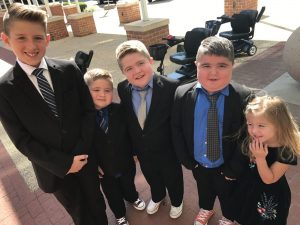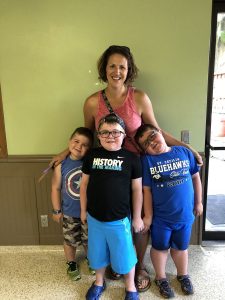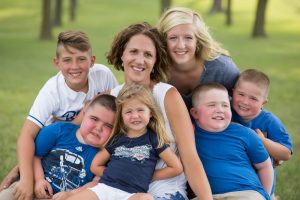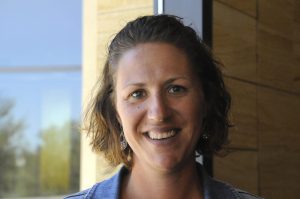#PPMD2018 – Nebraska Mother of 3 Duchenne Boys: ‘We’ve Made a Choice to Be Positive’
Written by |
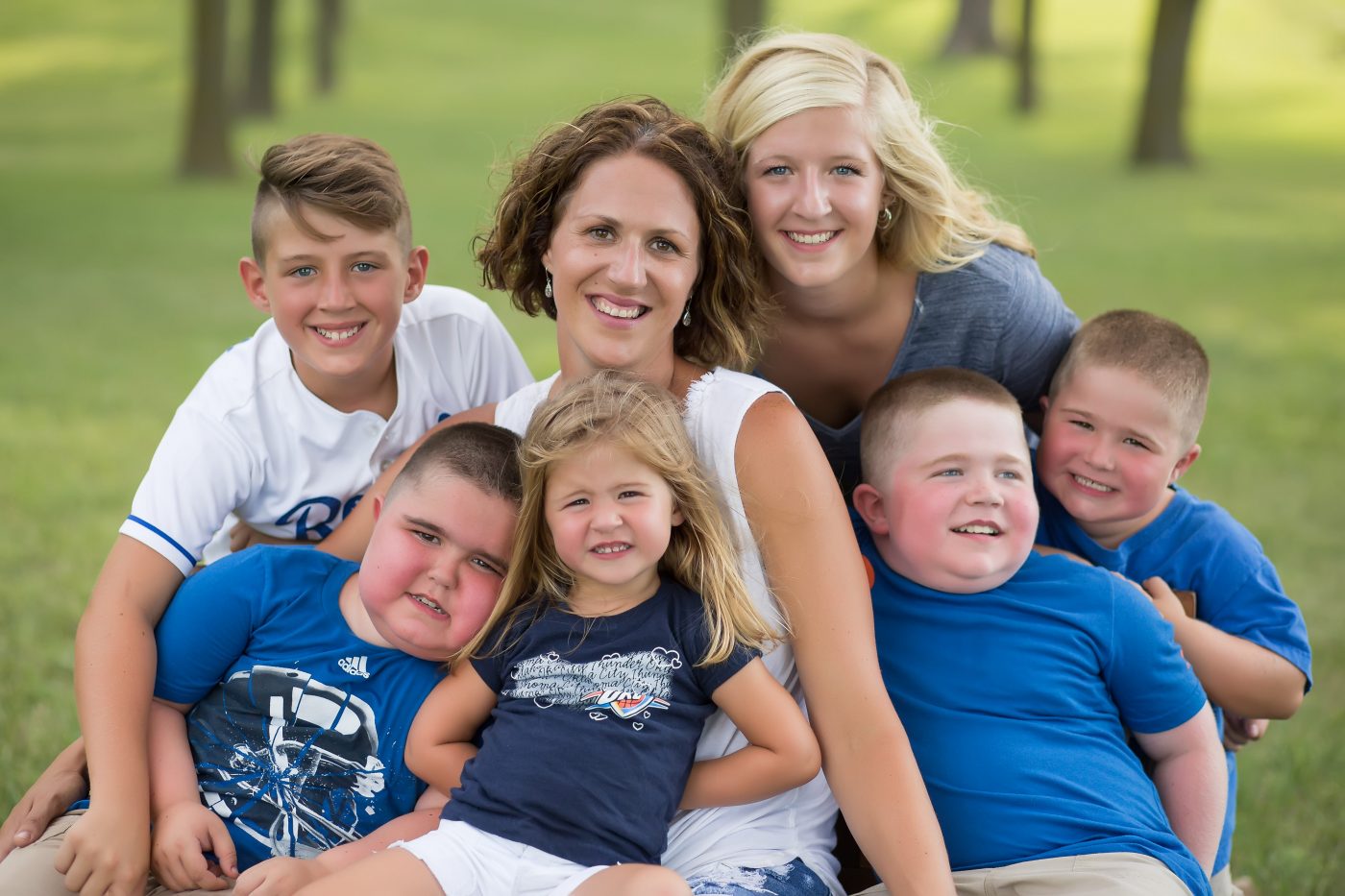
Betty Vertin of Hastings, Nebraska, and her six children — three of whom have Duchenne. (Photo courtesy of Vertin family)
Betty Vertin had never heard of Duchenne muscular dystrophy before July 8, 2010 — the day a neurologist in Omaha, Nebraska, diagnosed her son Max with the rare disease.
“Will you spell that for me?” she remembers asking the doctor through her tears. Vertin was 10 weeks pregnant when she got the shocking news. What she didn’t know was that her next son, Rowen, would also eventually be diagnosed with Duchenne. So would a third son, Charlie.
Vertin, now 38, is one of only a handful of women around the world who have given birth to three boys with Duchenne. She’s also testified in Washington before the U.S. Food and Drug Administration (FDA), along with her kids, on behalf of New Jersey-based PTC Therapeutics, and is active in the nonprofit group Parent Project Muscular Dystrophy (PPMD).
“I don’t know what it’s not like to have three sons with Duchenne,” Vertin told Muscular Dystrophy News Today during the PPMD’s recent 2018 Annual Conference in Scottsdale, Arizona. “It’s all I’ve ever known.”
In addition to 12-year-old Max, 9-year-old Rowen and 7-year-old Charlie, Vertin and her husband, Jason, also have a son who’s not affected by the disease, as well as two daughters. Although Vertin has no family history of Duchenne, she’s a carrier — and this has had implications for her own health.
“We don’t know if the girls are carriers yet. I could have passed that on to them,” she said, explaining what that means in practical terms. “For example, there’s scar tissue in my heart. The same disease that happens in the boys’ hearts can happen in the mother’s heart too. So I’m on three heart meds a day, including a beta blocker. That slows me down and makes me tired. But with six kids, I need my energy. I can’t be tired.”
Early signs of trouble
Vertin was born and raised in Hastings, the south-central Nebraska town where Kool-Aid was invented in 1927. In college, the 6-foot-tall woman was athletic, excelling in weightlifting and shotput. Her athletic background, she said, helped prepare her for the physical demands of being a Duchenne mom.
“I was pregnant with Charlie when Max was diagnosed at 4 years old,” she said. She knew something was wrong when Max — who weighed 10 pounds at birth — began missing milestones, such as crawling and walking late. His brother Chance, born 17 months later and unaffected by Duchenne, was running long before Max could.
“There were all these little signs, but it was when they went to pre-school the first year that I noticed Max was way behind his peers, though not socially or academically,” said Vertin, describing Max and his affected brothers as “happy, funny, outgoing goofballs.”
Rowen is also high-functioning and smart, though he’s autistic.
“With Duchenne, there’s more of a risk of having autism. Our first focus is to try to treat the Duchenne, but behaviors do pop up,” she said. “Anytime we change plans, that really irritates Rowen. He’s happiest when he can have some alone time.”
All three boys have a nonsense mutation in exon 34 of the DMD gene responsible for producing dystrophin, a protein essential for muscle health. As such, all are participating in the extended-access part of PTC’s Phase 3 clinical trial (NCT02090959) for Translarna (ataluren).
Private insurance, Medicaid eases Duchenne’s financial burden
PTC has received conditional approval from the European Medicines Agency to market Translarna within the 28-member European Union. But the FDA’s Peripheral and Central Nervous Systems Drugs Advisory Committee concluded in September 2017 that evidence to support its effectiveness as a Duchenne treatment was inconclusive, and that Translarna need undergo further research. [Another and long-term Phase 3 trial (NCT03179631) is now enrolling 250 Duchenne patients with nonsense mutations.]
“We only have to go once a year to Kansas City. PTC sends us the drugs every three months,” Vertin said. “If we had to pay for this out of pocket, it would have cost us tens of thousands of dollars per boy per year. There’s no way we could afford that.”
Betty and Jason Vertin have private insurance, and the family also qualifies for Nebraska’s Medicaid plan. Jason is a product supervisor for a local manufacturing company, and Betty worked at various education-oriented nonprofit groups before becoming a full-time mom.
“It’s a lot of stress, but we’ve made a choice to live life the best we can and be positive,” she said. “We focus on finding the joy in life and counting our blessings. We’ve found that even if they’re teeny, tiny ones, the sum of the small joys is bigger than Duchenne.”
Max, who recently turned 12, is still fully ambulatory. Walking is considerably harder for Rowen, who must keep both hands on the railing when climbing or descending stairs.
“Typically, if I’m anywhere near, he waits for me to lift him,” she said. “It’s very hard for him to get up from a seated position on the floor. Charlie is doing really well. He’s going to be a lot like Max.”
Learning from other Duchenne families
Besides Translarna, all three boys take PTC’s therapy Emflaza (deflazacort), which costs at least $35,000 a year for each boy (the price is based on the patient’s weight). They’re also on the natural antioxidant CoQ10, along with omega-3, vitamin D and Colace (docusate sodium) for constipation. Max also takes spironolactone for his heart, as well as metformin and a growth hormone, because the steroids have stopped his growth.
Vertin knows of at least 20 boys and young men in Nebraska with Duchenne. She’s in touch with most of their families, and is particularly active on Facebook. In her spare time, she also maintains a blog, “Weathered Storms,” about her life.
In her most recent post, she wrote: “Eight years ago, I never would have imagined the happiness that exists in our lives today. I never would have imagined Max would be walking, acting in plays, and have supportive and loving friends. I never would have thought we’d have another baby. I never would have imagined so many potential therapies that could change the outcome of the disease.”
This, Vertin said, is why she attended PPMD’s Arizona conference last month: to learn from other Duchenne parents, share stories, find out what’s working and, above all, to never lose hope.
“We’ve been very open with our sons their whole lives. They’re very aware of Duchenne and understand why things are so hard for them. They also know what each of their meds are for,” she said. “We don’t talk about what the end result could be. We just focus on today.”



